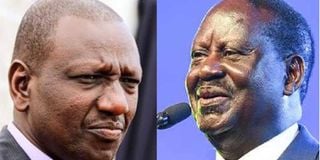Politics of GMO debate

President William Ruto (left) and Azimio leader Raila Odinga. The past few days have witnessed a raging debate over the introduction of GM food in the country pitting the two leaders.
The past few days have witnessed a raging debate over the introduction of GM food in the country pitting two extreme sides.
On one side are President William Ruto and his pro-GMO brigade of politicians, professionals and members of the public. On the other side is Azimio la Umoja One Kenya Coalition leader Raila Odinga and his anti-GMO brigade of the public, religious leaders and political and non-political actors.
Disagreements over problems and policies arise from many factors—including material interests, socio-cultural values and political (dis)trust.
Nothing illustrates that better than the case of Mr Odinga, who, as the Prime Minister in 2011, is on record as having defended the introduction of GMO in the country but is vehemently opposed to it. That could be based on material interests or political distrust.
What we have in the GMO debate is, basically, the framing of problems and solutions in different ways—the language of economic benefits, ideological outlooks, group values and political loyalties. And this is not beneficial to the common man.
Since leaders typically offer simplified and persuasive narratives to attract support for their preferred approach, the recourse should be to science, research, evidence and expertise. The debate should be led by researchers at universities, the National Biosafety Authority (NBA), Kenya Medical Research Institute (Kemri), Kenya Agricultural and Livestock Research Organization (Kalro) and Kenya Institute of Public Policy Research and Analysis (Kippra).
Through these institutions, we have developed a wealth of researchers and information that can help us to steer this debate professionally. But our policy actors mobilise evidence and expertise selectively to influence the perceived credibility of their favoured options. That creates the institutional crisis of lack of confidence in our public institutions; hence, their advice may not be acceptable to all.
Policy debates are structured through an interplay of forms of knowledge, values, emotions and interests.
Mr Kaboi, a political scientist, was a deputy manager, Mwea Constituency. [email protected].




